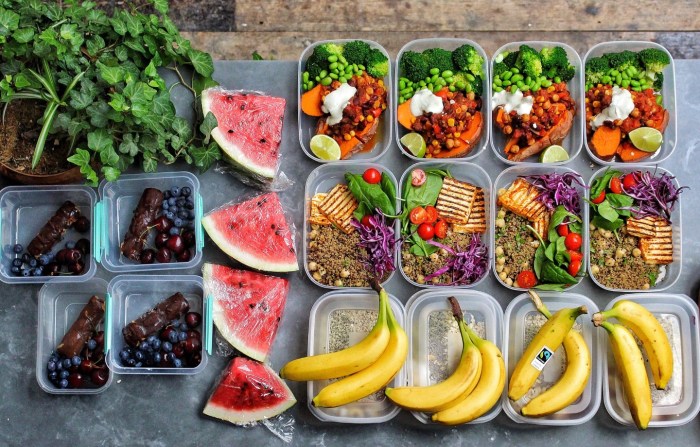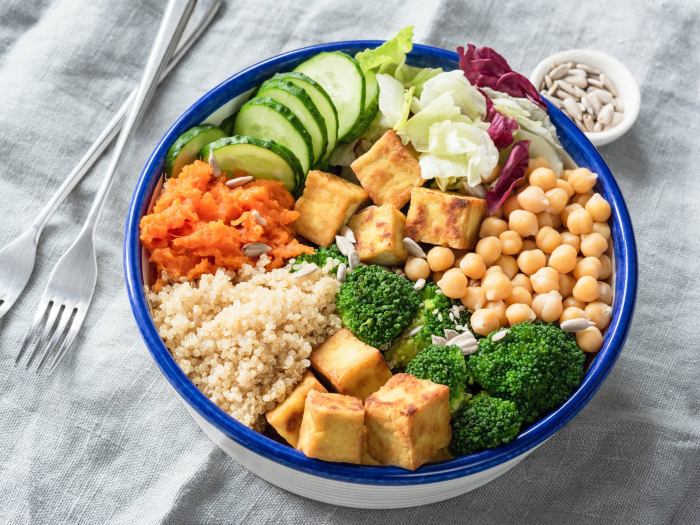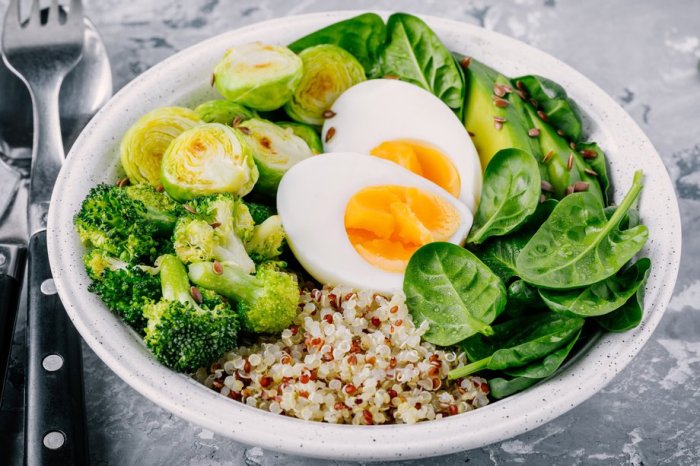Embarking on a vegetarian diet is not just a culinary choice; it’s a lifestyle that embraces health, sustainability, and ethical considerations. Vegetarian diet meals offer a delectable array of plant-based options that cater to diverse tastes and nutritional needs. Join us as we delve into the world of vegetarian cuisine, exploring meal plans, recipes, preparation techniques, and the essential nutrients that fuel a plant-powered lifestyle.
From hearty breakfasts to satisfying dinners and nutritious snacks, vegetarian meals are a symphony of flavors and textures. We’ll guide you through the art of creating balanced and flavorful vegetarian dishes, empowering you to nourish your body and delight your taste buds.
Vegetarian Diet Meal Plans
Vegetarian diets offer numerous health benefits, including reduced risk of heart disease, stroke, type 2 diabetes, and certain types of cancer. They are also high in fiber, antioxidants, and phytonutrients, which promote overall well-being.
Sample 7-Day Vegetarian Meal Plan
This plan provides approximately 2,000 calories per day: Day 1:
Breakfast
Oatmeal with berries and nuts
Lunch
Embrace the wonders of seafood and vegetables with pescatarian meal prep. This approach offers a balanced and sustainable way to nourish your body. From grilled salmon with roasted asparagus to quinoa bowls brimming with shrimp, avocado, and leafy greens, pescatarian meal prep simplifies healthy eating while tantalizing your taste buds.
Lentil soup with whole-wheat bread
Dinner
Vegetable stir-fry with brown rice Day 2:
Breakfast
Yogurt with fruit and granola
Lunch
Bean and cheese burrito with salsa
Dinner
Vegetarian chili with cornbread Day 3:
Breakfast
Tofu scramble with vegetables
Lunch
Salad with grilled tofu, chickpeas, and quinoa
Dinner
Vegetarian lasagna with whole-wheat pasta Day 4:
Breakfast
Smoothie made with fruits, vegetables, and plant-based milk
Lunch
Leftover vegetarian lasagna
Dinner
Vegetable curry with roti Day 5:
Breakfast
Whole-wheat toast with avocado and eggs
Lunch
Black bean tacos with brown rice
Dinner
Vegetarian pizza with whole-wheat crust Day 6:
Breakfast
Pancakes made with whole-wheat flour and fruit
Lunch
Leftover vegetarian pizza
Dinner
Vegetarian shepherd’s pie with mashed potatoes Day 7:
Breakfast
Waffles made with whole-wheat flour and fruit
Lunch
Salad with grilled vegetables, beans, and quinoa
Dinner
Vegetarian burgers with whole-wheat buns
Embark on a healthy eating journey with pescatarian meal prep. This approach combines the benefits of a vegetarian diet with the inclusion of seafood, offering a nutritious and balanced meal plan. By planning your meals ahead of time, you can save time and effort while ensuring you have delicious and healthy options at your fingertips.
Tips for Creating a Balanced and Nutritious Vegetarian Diet
* Include a variety of fruits, vegetables, whole grains, legumes, nuts, and seeds.
- Choose plant-based sources of protein, such as beans, lentils, tofu, tempeh, and quinoa.
- Get enough calcium from fortified plant-based milk, leafy green vegetables, and tofu.
- Ensure adequate vitamin B12 intake by consuming fortified foods or taking supplements.
- Limit processed foods, sugary drinks, and unhealthy fats.
Vegetarian Recipes

Vegetarian cuisine offers a wide variety of delicious and nutritious meals for breakfast, lunch, dinner, and snacks. Here’s a categorized list of vegetarian recipes to inspire your culinary adventures.
Breakfast
Start your day with a satisfying vegetarian breakfast that will fuel your body and mind.
- Oatmeal with Berries and Nuts:A classic and nutritious breakfast made with rolled oats, fresh berries, and crunchy nuts.
- Scrambled Tofu with Vegetables:A savory and protein-packed breakfast featuring crumbled tofu cooked with your favorite vegetables.
- Vegan Pancakes:Fluffy and delicious pancakes made with plant-based milk and topped with fruit syrup.
- Breakfast Burrito with Beans and Avocado:A hearty and portable breakfast filled with black beans, avocado, and salsa.
- Chia Seed Pudding with Fruit:A nutrient-rich and refreshing breakfast made with chia seeds, almond milk, and fresh fruit.
Lunch
Enjoy a satisfying and vegetarian-friendly lunch that will keep you energized throughout the afternoon.
- Lentil Soup:A comforting and flavorful soup made with lentils, vegetables, and spices.
- Chickpea Salad Sandwich:A protein-packed and refreshing sandwich featuring chickpeas, vegetables, and hummus.
- Vegetable Stir-Fry with Brown Rice:A healthy and colorful stir-fry made with a variety of vegetables and served over brown rice.
- Quinoa Salad with Roasted Vegetables:A nutrient-rich salad made with quinoa, roasted vegetables, and a tangy dressing.
- Vegan Tacos:A flavorful and customizable dish featuring corn tortillas filled with seasoned tofu, vegetables, and your favorite toppings.
Dinner
Indulge in a delicious and satisfying vegetarian dinner that will leave you feeling full and content.
- Vegetable Curry:A flavorful and aromatic curry made with a variety of vegetables, spices, and coconut milk.
- Shepherd’s Pie with Lentil Filling:A classic comfort food featuring a mashed potato topping and a hearty lentil filling.
- Portobello Mushroom Steaks:Grilled portobello mushrooms topped with a flavorful marinade and served with roasted vegetables.
- Vegetable Lasagna:A hearty and layered dish made with pasta sheets, vegetables, cheese, and a creamy sauce.
- Vegetable Pad Thai:A popular Thai dish made with stir-fried rice noodles, vegetables, and a sweet and savory sauce.
Snacks
Satisfy your cravings between meals with these healthy and vegetarian-friendly snacks.
- Fruit and Vegetable Platter:A colorful and refreshing snack featuring fresh fruits and vegetables.
- Hummus with Vegetable Sticks:A protein-rich and dippable snack featuring hummus and your favorite vegetable sticks.
- Trail Mix:A portable and energy-boosting snack made with nuts, seeds, and dried fruit.
- Popcorn:A low-calorie and whole-grain snack that can be enjoyed plain or seasoned.
- Smoothie:A refreshing and nutrient-packed drink made with fruits, vegetables, and plant-based milk.
Vegetarian Meal Preparation
Meal prepping is a great way to save time and money, and it can be especially beneficial for vegetarians. When you meal prep, you cook a large batch of food once and then portion it out into individual meals that you can eat throughout the week.
This can save you a lot of time during the week, as you won’t have to cook every night. It can also help you to eat healthier, as you’ll be more likely to have healthy meals on hand when you’re hungry.
To meal prep vegetarian meals, you’ll need to start by planning your meals. Decide what you want to eat for each meal, and then make a grocery list based on your plan. Once you have your groceries, you can start cooking.
Cook a large batch of each meal, and then portion it out into individual containers. You can store the containers in the refrigerator or freezer, and then reheat them when you’re ready to eat.
Storing Vegetarian Meals
- Vegetarian meals can be stored in the refrigerator for 3-4 days.
- Vegetarian meals can be stored in the freezer for up to 3 months.
- When reheating vegetarian meals, be sure to reheat them to an internal temperature of 165 degrees Fahrenheit.
Reheating Vegetarian Meals
- Vegetarian meals can be reheated in the microwave, oven, or on the stovetop.
- When reheating vegetarian meals in the microwave, be sure to cover the container with a lid or plastic wrap.
- When reheating vegetarian meals in the oven, be sure to preheat the oven to 350 degrees Fahrenheit.
- When reheating vegetarian meals on the stovetop, be sure to heat them over medium heat.
Vegetarian Nutrition
A vegetarian diet, excluding meat and fish, necessitates careful consideration to ensure adequate nutrient intake. Vegetarians must pay particular attention to essential nutrients, including protein, iron, calcium, vitamin B12, and omega-3 fatty acids.
Protein, essential for building and repairing tissues, is abundant in legumes, lentils, tofu, tempeh, nuts, and seeds. Iron, crucial for oxygen transport, is found in leafy green vegetables, fortified cereals, and beans. Calcium, vital for bone health, is present in dairy products (for lacto-vegetarians), leafy green vegetables, and fortified plant-based milk.
Vitamin B12
Vitamin B12, essential for nerve function, is primarily found in animal products. Vegetarians must rely on fortified foods, such as cereals, nutritional yeast, or supplements, to meet their needs.
Omega-3 Fatty Acids
Omega-3 fatty acids, important for heart and brain health, are primarily found in oily fish. Vegetarians can obtain them from flaxseeds, chia seeds, walnuts, and algae-based supplements.
| Nutrient | Good Sources |
|---|---|
| Protein | Legumes, lentils, tofu, tempeh, nuts, seeds |
| Iron | Leafy green vegetables, fortified cereals, beans |
| Calcium | Dairy products (for lacto-vegetarians), leafy green vegetables, fortified plant-based milk |
| Vitamin B12 | Fortified foods (cereals, nutritional yeast), supplements |
| Omega-3 Fatty Acids | Flaxseeds, chia seeds, walnuts, algae-based supplements |
Vegetarian Cooking Techniques

Vegetarian cooking encompasses various techniques that cater to the diverse range of plant-based ingredients. Mastering these techniques is crucial for creating flavorful and satisfying vegetarian meals.
Roasting
Roasting involves cooking vegetables in an oven at high temperatures. This technique caramelizes natural sugars, enhancing flavors and creating a crispy exterior. Roasting is ideal for root vegetables like carrots, potatoes, and parsnips, as well as vegetables like broccoli, cauliflower, and zucchini.
- Advantages:Concentrates flavors, creates a crispy texture, and preserves nutrients.
- Disadvantages:Can be time-consuming, requires preheating the oven, and may result in uneven cooking if not monitored.
Tips:Preheat the oven to ensure even cooking, use parchment paper for easy cleanup, and toss vegetables with olive oil, salt, and pepper to enhance flavors.
Stir-Frying
Stir-frying involves cooking vegetables in a hot wok or skillet with a small amount of oil. This technique requires quick and constant stirring to prevent burning. Stir-frying is suitable for vegetables like bell peppers, onions, carrots, and snap peas.
- Advantages:Preserves texture and nutrients, creates a flavorful sauce, and is relatively quick.
- Disadvantages:Requires a high heat source, can be messy, and may require specialized equipment.
Tips:Use a well-seasoned wok or skillet, heat the oil until shimmering, and stir vegetables constantly to prevent sticking.
Steaming
Steaming involves cooking vegetables over boiling water in a steamer or colander. This technique preserves nutrients and produces tender-crisp vegetables. Steaming is suitable for vegetables like asparagus, broccoli, and green beans.
- Advantages:Retains nutrients, prevents overcooking, and is a healthy cooking method.
- Disadvantages:Can be time-consuming and may not create a flavorful exterior.
Tips:Use a steamer with a tight-fitting lid to prevent steam from escaping, and steam vegetables until tender but still slightly firm.
Vegetarian Lifestyle

Vegetarianism is a way of life that promotes the consumption of plant-based foods while abstaining from animal products. It extends beyond dietary choices and encompasses ethical, environmental, and health considerations.
Ethical Considerations
Many vegetarians choose this lifestyle due to ethical concerns about the treatment of animals in factory farming. They believe that animals should not be subjected to inhumane conditions and that it is wrong to kill them for food.
Environmental Benefits
A vegetarian diet can significantly reduce one’s environmental footprint. Animal agriculture is a major contributor to greenhouse gas emissions, deforestation, and water pollution. By choosing plant-based foods, vegetarians help mitigate these impacts.
Success Stories, Vegetarian diet meals
Numerous individuals have successfully adopted a vegetarian lifestyle and experienced positive health and environmental benefits. Here are a few testimonials:
“After transitioning to a vegetarian diet, I noticed a significant improvement in my energy levels and overall well-being. I also feel more connected to the environment and the animals I share it with.”
– Sarah, Vegetarian for 5 years
“I started a vegetarian diet to reduce my carbon footprint and protect animals. It’s been a rewarding journey that has not only helped me achieve my goals but also improved my health.”
– John, Vegetarian for 10 years
Support Resources
For those interested in exploring a vegetarian lifestyle, there are numerous resources available. Here are a few examples:
- Vegetarian Resource Group (VRG)
- North American Vegetarian Society (NAVS)
- American Vegetarian Association (AVA)
Concluding Remarks
Adopting a vegetarian diet is a journey that transforms both your palate and your well-being. By embracing the vibrant world of plant-based cuisine, you not only unlock a wealth of culinary delights but also contribute to a healthier planet and a more compassionate society.
Remember, every vegetarian meal is a celebration of nature’s bounty, a testament to the power of mindful eating, and an investment in a sustainable future.
Answers to Common Questions: Vegetarian Diet Meals
What are the key benefits of a vegetarian diet?
Vegetarian diets are linked to reduced risk of heart disease, certain cancers, and type 2 diabetes. They are also typically higher in fiber, vitamins, and minerals than meat-based diets.
How can I ensure I’m getting all the essential nutrients on a vegetarian diet?
Pay attention to protein sources like beans, lentils, tofu, and tempeh. Include plenty of fruits, vegetables, and whole grains. Consider supplementing with vitamin B12, iron, and calcium as needed.
What are some tips for meal prepping vegetarian meals?
Cook in bulk and freeze leftovers. Utilize versatile ingredients that can be used in multiple dishes. Choose whole, unprocessed foods over packaged or processed options.